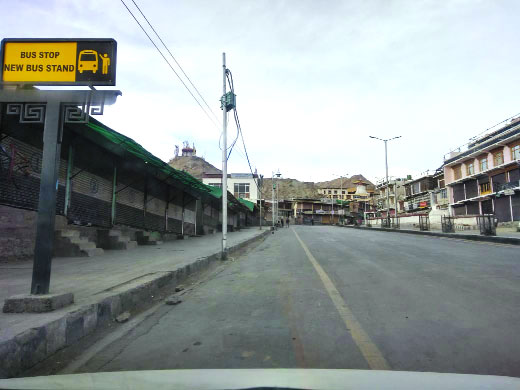As people stay at home, nature is flourishing in their absence, albeit temporarily. This is the time to introspect, change our habits and continue practising them once the lockdown is lifted, says Zakiya Banoo
The warmer weather brings hope for the inhabitants of Ladakh, the land of high passes, significant cultural heritage and extreme cold weather. This is the time when inhabitants of this snow desert let go of the winter and start planning for summer. People start preparing to resume their work after the long hibernation just like Marmots. But this year was different for people of Leh, just like the rest of the world. As the rays of sun started filtering in from the winter clouds, people of this cold desert learnt about the spread of novel Coronavirus.
India became one of the countries where COVID-19 made its presence felt. On January 30, the first case of was confirmed in the southern state of Kerala. In March, the number of confirmed cases from all over the country increased. In Ladakh’s Leh district, the first two cases of Coronavirus were confirmed on March 7 with both patients having a travel history to Iran.
As naïve as children are, many expressed happiness about the lockdown that was implemented to ensure ‘physical distancing’. While some, who really were looking forward to returning to college after winter slumber, felt disappointed. However, with time, as cases of Corona grew, the happiness subsided and everyone started praying for the recovery of those affected. Local administration, following the orders of the Central Government, implemented a strict lockdown in the region. Many students and volunteers supported the efforts of administration by reaching out to the public with detailed information about the virus — the symptoms and the precautions they must follow for the safety of their families and society.
The real challenge for us, Ladakhis, is the crucial timing when this virus entered our lives. During summer season, the expectations were to prepare better meals to compensate for the nutrient loss that our community faces in the winter season. People survive winter by having pulses and dry vegetables.
This is the time we look forward to resuming with our normal lives. People who run small businesses like shops were caught completely off guard and had no idea of how to manage their lives. They were worried about how would they find the means to feed their families. During winter, the shops are shut and they don’t earn anything and whatever money they had earned last summer, they had already spent it on the winter stock.
Migrants are the worst affected by the lockdown. People from other states like Bihar, Jammu and Kashmir, Jharkhand, who come here to work, have been left with no food, money or proper shelter. The tourism industry — the fuel of Ladakh’s local economy — is severely affected due to stay-at-home orders and so is the life of these workers who depend on these resources for their survival. Both local and central administration is helping the migrant population by providing them food. People of Ladakh have also contributed to the efforts of the administration.
In these tough times, those who have the privilege to survive and stay safe inside their houses should utilise this opportunity to work on themselves. Ladakh, which is already less polluted compared to other places, is now witnessing even clearer skies and fresher air due to temporary shutdown of a lot of industries, factories and small companies. Families are spending time together, especially with the grandparents. Interaction with neighbours has increased. One of the most important changes that have taken place is that people are doing their own work without being dependent on labourers.
The lockdown days have turned out to be a nostalgic trip down the memory lane of my childhood. I am reminiscing about things that I have not done since childhood as I have started engaging in them again. Along with my family, I am working in the garden and field, spending time with animals and sharing our thoughts. We are utilising the days by learning new things like cooking different dishes, playing board games, watching films and exploring world through the eyes of our elders. Grandparents share stories of their childhood, making us realise how different their times were. During night, while sitting near the bonfire, we sing, dance and solve riddles.
Every day, I sit near the Indus. Everything around this mighty river looks so calm and peaceful. And I ask myself, how quickly will this go back to being polluted once the lockdown is lifted? The river and its environs will be flooded with plastic and all sorts of other waste from our houses, hotels and restaurants. This is the time to introspect, change our habits and continue practicing them once the lockdown is lifted. Undoubtedly, COVID-19 has made us realise the importance of things that we always took for granted. Many lives have been lost in our country and around the globe. The times are tough but we should not give up yet. We should be hopeful of a bright future where all of us will play our roles more responsibly. This is the time to prepare ourselves to become better human beings.
—Charkha Features


























